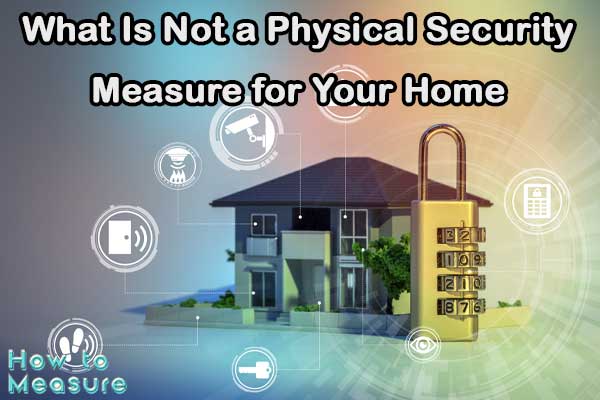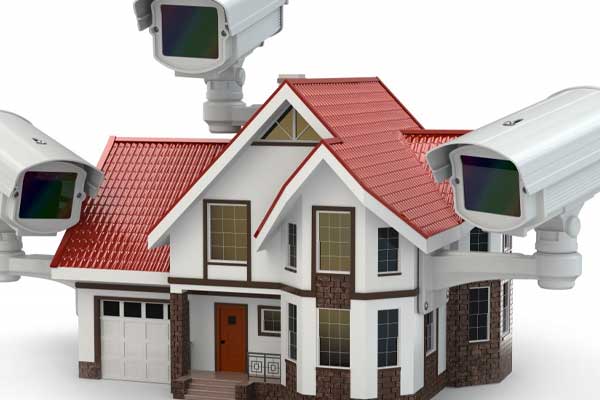When it comes to our homes, safety is a top priority. We invest in various security measures to protect our loved ones and possessions. Physical security measures, such as sturdy locks, alarms, and surveillance cameras, are commonly employed to deter potential intruders. However, it’s equally essential to understand what doesn’t constitute an effective physical security measure for your home. In this article on How to Measure, we will explore 25 misconceptions and ineffective practices, ensuring you comprehensively understand how to safeguard your home better. Now we will check What Is Not a Physical Security Measure for Your Home.
What Is Not a Physical Security Measure for Your Home?
Leaving Spare Keys Under the Doormat: A seemingly convenient solution, leaving spare keys under the doormat is a well-known habit. However, this practice exposes your home to unnecessary risks, as experienced burglars often target conventional hiding spots. To enhance security, opt for alternatives like entrusting spare keys to trusted neighbors or investing in a smart lock system that provides controlled access.
Relying Solely on Security Stickers: Security stickers on windows and doors serve as a visual deterrent, but they should not be your primary line of defense. To fortify your home, consider investing in a security system with sensors, alarms, and professional monitoring services.
Neglecting Regular Maintenance: Your security system and locks need consistent maintenance to operate optimally. Ignoring routine upkeep can compromise their effectiveness, leaving your home susceptible to breaches. Make a habit of inspecting and servicing your security equipment.
Using Fake Security Cameras: While fake security cameras might seem like a cost-effective alternative, skilled intruders can quickly identify them. To ensure real-time surveillance and deter potential threats, it’s wiser to invest in authentic, high-quality surveillance cameras.
Not Securing Sliding Doors and Windows: Sliding doors and windows are vulnerable entry points that should not be overlooked. Failing to secure them adequately increases the risk of break-ins. Consider reinforcing them with security bars or specialized locks to prevent unauthorized access.
Overlooking Outdoor Lighting: Darkness provides cover for potential criminals. Effective outdoor lighting eliminates hiding spots and enhances overall security around your home. Utilize motion sensor lights and well-lit pathways to discourage unauthorized access.
Hiding Valuables in Obvious Places: Common hiding spots for valuables, like under mattresses or in sock drawers, are easily discernible by burglars. To safeguard your valuable possessions, invest in a secure safe that provides reliable protection.
Sharing Too Much on Social Media: Posting vacation plans or broadcasting your absence on social media platforms inadvertently invites burglars to target your unattended home. Exercise caution when sharing sensitive information online to mitigate this risk.
Neglecting Garage Security: The garage is often an overlooked point of entry. Ensuring the security of your garage door and considering using smart garage door openers can bolster your overall home security strategy.
Using Weak Passwords: Weak passwords for your smart security systems can be exploited by hackers, potentially compromising your entire network. Implement strong, unique passwords for all devices and accounts to fortify your digital defenses.
Leaving Tools and Ladders Outside: Tools and ladders left outdoors can facilitate unauthorized access for potential burglars. Safely store these items in a locked shed or garage to prevent unintended entry points.
Forgetting to Lock Up: While seemingly simple, neglecting to lock doors and windows is a common oversight. Develop a habit of double-checking all entry points before leaving your home to ensure their security.
Not Utilizing Home Automation: Home automation technology offers the illusion of an occupied home even when you’re away, deterring potential intruders. Incorporate features like smart plugs and lighting systems to maintain a sense of presence.
Ignoring Landscaping: Overgrown foliage provides hiding spots for criminals attempting to infiltrate your property. Regularly maintain your landscaping to eliminate these hiding opportunities and increase overall visibility.
Not Communicating With Neighbors: Establishing a strong sense of community and open communication with neighbors can significantly enhance your home security. Collaborating to watch out for suspicious activities fosters a safer environment for everyone.
Using Cheap Locks: Opting for inexpensive locks can compromise your home’s security. High-quality locks with enhanced durability and resistance to tampering are essential for effective protection.
Neglecting Your Mailbox: A mailbox overflowing with uncollected mail signals that your home may be vacant. To avoid this, arrange for a neighbor to collect your mail or request a temporary mail hold during your absence.
Relying Only on Security Cameras: While security cameras are valuable tools for surveillance, they alone cannot prevent a break-in. Complement their use with other security measures like alarms and motion sensors.
Not Installing Reinforced Doors: Weak doors present an easy entry point for burglars. Install doors with robust frames, hinges, and sturdy construction to enhance your home’s security.
Ignoring the Perimeter: Safeguarding your property’s perimeter with fences, gates, and motion-sensor lighting discourages potential intruders from approaching your home in the first place.
Underestimating the Importance of Windows: Windows are frequently targeted point of entry. To fortify their security, consider installing security films or reinforcing them to make them more resistant to break-ins.
Leaving Spare Keys in Obvious Places: Hiding spare keys in predictable locations, like under potted plants or fake rocks, can jeopardize your home security. Choose less conspicuous options to ensure the safety of your spare keys.
Not Securing the Wi-Fi Network: An unsecured Wi-Fi network is susceptible to cyberattacks. Implement strong encryption and a secure password for your home network to prevent unauthorized access.
Using Outdated Security Systems: Older security systems might lack the features and updates necessary to address modern threats. Upgrading to current technology ensures that your home remains well-protected.
Neglecting Family Emergency Plans: Preparing your family for potential emergencies, such as break-ins or fires, is fundamental to home security. Create comprehensive emergency plans and practice them regularly to ensure everyone’s safety.
Incorporating a comprehensive approach to home security involves addressing physical, digital, and procedural aspects. By recognizing these common mistakes and taking proactive measures to rectify them, you can establish a more robust and effective security strategy for your home.
Conclusion
By understanding what is not a physical security measure for your home, you can take proactive steps to enhance your home’s safety. Avoid common misconceptions and ineffective practices, and instead, invest in robust security measures. From smart locks and surveillance cameras to proper maintenance and communication with neighbors, a comprehensive approach to home security can provide peace of mind for you and your loved ones.
Frequently Asked Questions (FAQs)
- Q: Are security stickers entirely useless?
- Security stickers can act as a deterrent, but they are not enough. It’s crucial to have a real security system to back them up.
- Q: Can I hide a spare key somewhere less obvious?
- It’s best to avoid hiding spare keys outside altogether. Instead, consider entrusting a spare key to a neighbor you can rely on.
- Q: How often should I maintain my security system?
- Regular maintenance is vital for the proper functioning of your security system. Aim for yearly check-ups and immediate repairs if any issues arise.
- Q: Should I use a combination of real and fake security cameras?
- It’s best to avoid using fake security cameras altogether, as experienced burglars can quickly identify them. Invest in genuine surveillance cameras for maximum effectiveness.
- Q: Do I need to secure my sliding doors and windows?
- Yes, securing sliding doors and windows is essential. Intruders often target them due to their vulnerability.
- Q: Can I use the same password for multiple devices?
- No, using the same password for multiple devices is a security risk. Each device and account should have a unique, strong password.












